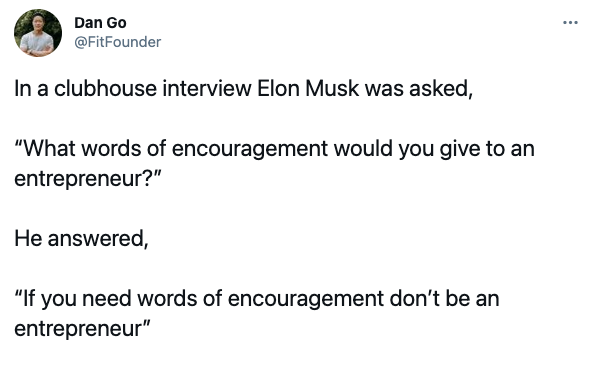It’s been touted as the “next big thing”, and it has left a lot of us wondering: what is Clubhouse, and should I be using it for my business?
In a fast-paced industry like entrepreneurship, it can be a challenge in itself to identify what the next big trend is going to be, but Clubhouse is quickly becoming more than just an emerging platform, it’s also proving itself to be a key tool for savvy business owners and entrepreneurs.
You might have heard about the app from others or seen the word “Clubhouse” floating around on other social media platforms, and wondered to yourself if it’s something that you should look into.
Well, here at Founder, we want to make sure you have all of the latest information and tools at your disposal to grow your brand and your business, so we’ve decided to conduct a deep-dive to assess whether Clubhouse is something you should be using.
The good news is: Clubhouse should absolutely be on your radar, because, if used correctly, it will be invaluable.
Experts the world over are debating its potential, but one thing is for certain:
“Nothing is better for marketers and people that would benefit from business connections than a new social media platform with low dilution and great reach. And that’s Clubhouse, for now” – Entrepreneur.com
Ready to find out more about Clubhouse? Let’s go, Foundr style: from the top down.
What is the Clubhouse App?
The Clubhouse app, launched in April 2020 by Paul Davidson and Rohan Seth, is an audio-only social networking app that allows users to hold discussions on a variety of topics in various “rooms”. Clubhouse conversations range from anything and everything in between from politics and dating, to economics and stock market predictions.
In May 2020, just a month after launch, the iOS-only app had gone from 750 daily users to 600,000 and received a $12 million Series-A investment from venture firm Andreessen Horowitz.
By January 2021, the app reached a whopping $1billion valuation and according to Clubhouse’s blog, it currently has more than 180 investors in the app. Reports show that not only does Clubhouse have over six million users, most of which were added between January and February 2021, but they have over ten million downloads globally.
Big names are a common sight on the app, with celebrities such as Oprah, Drake, Kevin Hart, and Jared Leto jumping in and out of rooms and hosting clubs.
In January 2021, Elon Musk made his Clubhouse debut for an interview in the GOOD TIME club, which was quickly closed after reaching the app’s maximum room capacity of 5,000 users. After answering questions about space travel, colonies on Mars, cryptocurrency, AI, and entrepreneurship, Musk was then joined by Vlad Tenev, CEO of Robinhood to discuss the recent Robinhood/GameStock debacle.
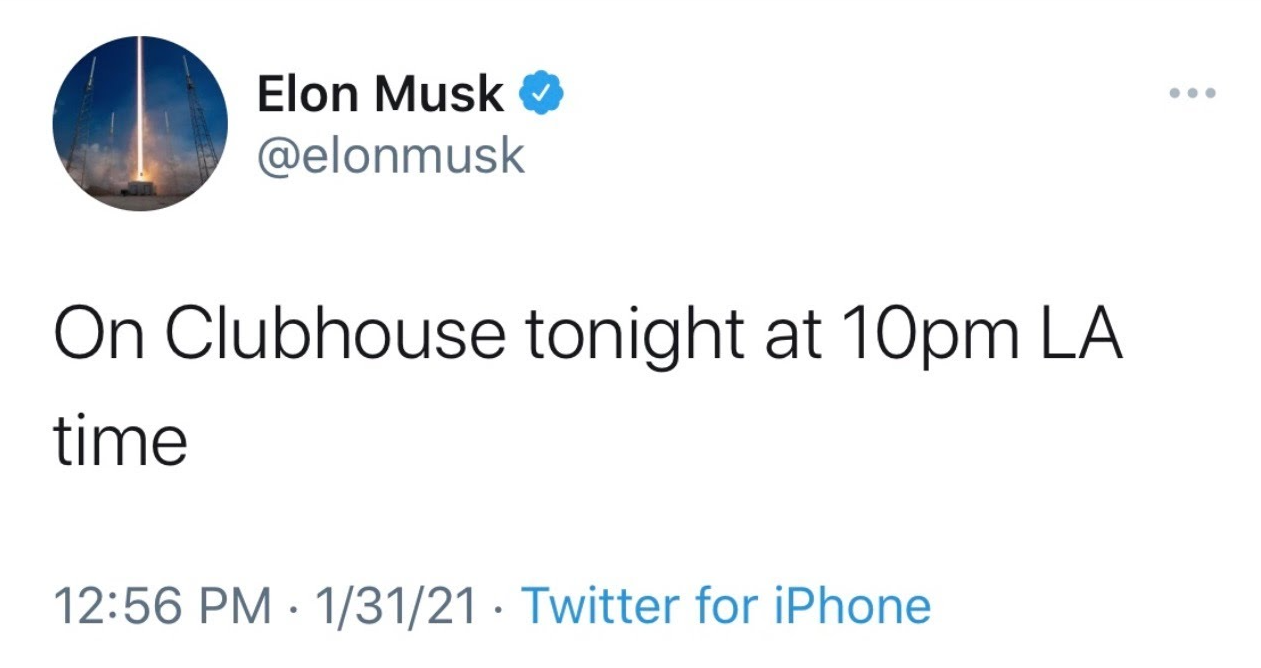
While Clubhouse doesn’t allow for recording or archiving of conversations (some say this is purposefully done to incite a feeling of “FOMO”), millions have now listened to bootleg copies of the discussion and dissected every piece of advice shared by the SpaceX founder (you can read a pretty concise transcript here).
Musk tweeted out in February that he was going to be hosting another discussion with Kanye West, and even tweeted at the official account of Russian president Vladimir Putin asking for a conversation.
With a 5,000 user limit per room, you’ll need to get in early to hear those conversations live.
READ MORE: The 28 Essential Facebook Ad Terms You Need To Know
How Does the Clubhouse App Work?
Clubhouse is invite-only, meaning you can only use it if you have been invited to join by another user. Each user is then given 3 invites to share with others.
The app is only available on iOS, although Clubhouse has suggested they are working on an Android version, and this coupled with only 3 invites per user really drives home the exclusivity of the app.
We will get more in-depth with the technicalities of Clubhouse later in the article, but for now, let’s have a look at the app top-level:
The app is audio-only and allows users to hold conversations and discussions in virtual “rooms.”
When you enter a room, you are either a moderator, a speaker, or a listener.
- Listeners: When you join an existing room, you automatically enter the audience on mute as a listener. If you want to join in the conversation, you can “raise your hand” letting the speakers know that you have something to say.
- Moderator: When you start a room, you are automatically the moderator. This means you are a speaker who has the unique ability to add or remove other speakers as well as mute them. You control and guide the conversation, curate a group of speakers, and cater to the audience by allowing questions
- Speakers: These are the people in a room who have the ability to talk. Listeners will be invited up to the “stage” to speak, but they must be approved to do so
Users can come and go as they please from discussions. The app has been designed to continue running in the background, similar to a podcast, so listeners often have discussions playing in the background while they work, exercise, or do house chores.
READ MORE: 10 Instagram Growth Hacks For More Engaged Followers (Without Running Ads)
Why Is It A Notable App For Entrepreneurs?
Some entrepreneurs may feel as though they can’t keep up with the latest in the world of social media, and it can be exhausting to add another one to the pile. However, when it comes to Clubhouse, there is a much more valuable experience to be had for entrepreneurs than other platforms on the market.
Imagine you have the chance to jump on the phone to 10 VCs who were actively looking for the next best thing. What about if you had a room of 100 other entrepreneurs ready to listen to your big pitch and ready to give you feedback while you sit at home in your pajamas?
Just imagine you were given the opportunity to sit and listen to a conversation between Marc Randolph, Sean Raad, Kenneth Cole, and Zak Williams as they discuss mental health and the future of technology.
Well, that’s what Clubhouse is offering.
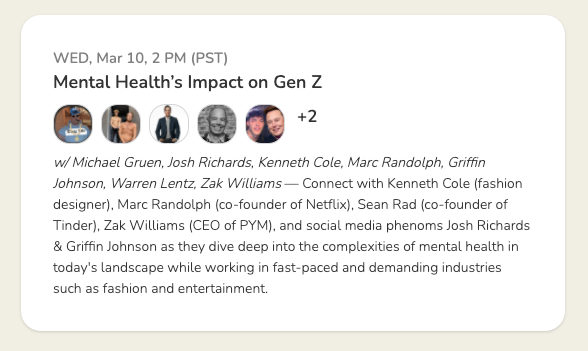
Jeremy Knauff, CEO at digital marketing agency Spartan Media has been quoted by INC.com as saying that the access to well-known names on Clubhouse is “mind-blowing…it’s like cramming everybody into a stadium and doing an episode of Shark Tank.”
Clubhouse gives you the opportunity to have a direct line with influential industry leaders. Think of it as a virtual careers exhibition with different panel discussions, meet-and-greets, and the rare opportunity to get your brand in front of investors.
“This environment is like a turbocharged incubator for business opportunities that benefits everyone from those just getting started, all the way up to world-famous multi-millionaires like Cardone, Kevin Harrington, and Tyrese Gibson”.
READ MORE: How to Start a Podcast on a Budget
How To Get Started On Clubhouse
How Do You Get an Invite to Clubhouse?
Just like the early days of Facebook, Clubhouse relies on exclusivity. Keep an eye open on social channels, discussion boards, and ask your co-workers, friends, and family who might have an invitation.
If you’re struggling to find an invite, don’t worry as you can sign up at any time, create a username, and go on the “waitlist”. Contacts of yours who are on Clubhouse will get a notification that you’ve joined the waitlist, and they can give you an invite to bump you up the list.
It’s reported that invites for Clubhouse are being sold on eBay for $100+, but we strongly recommend you don’t resort to buying these invites.
After someone extends an invitation, you’ll receive this message:
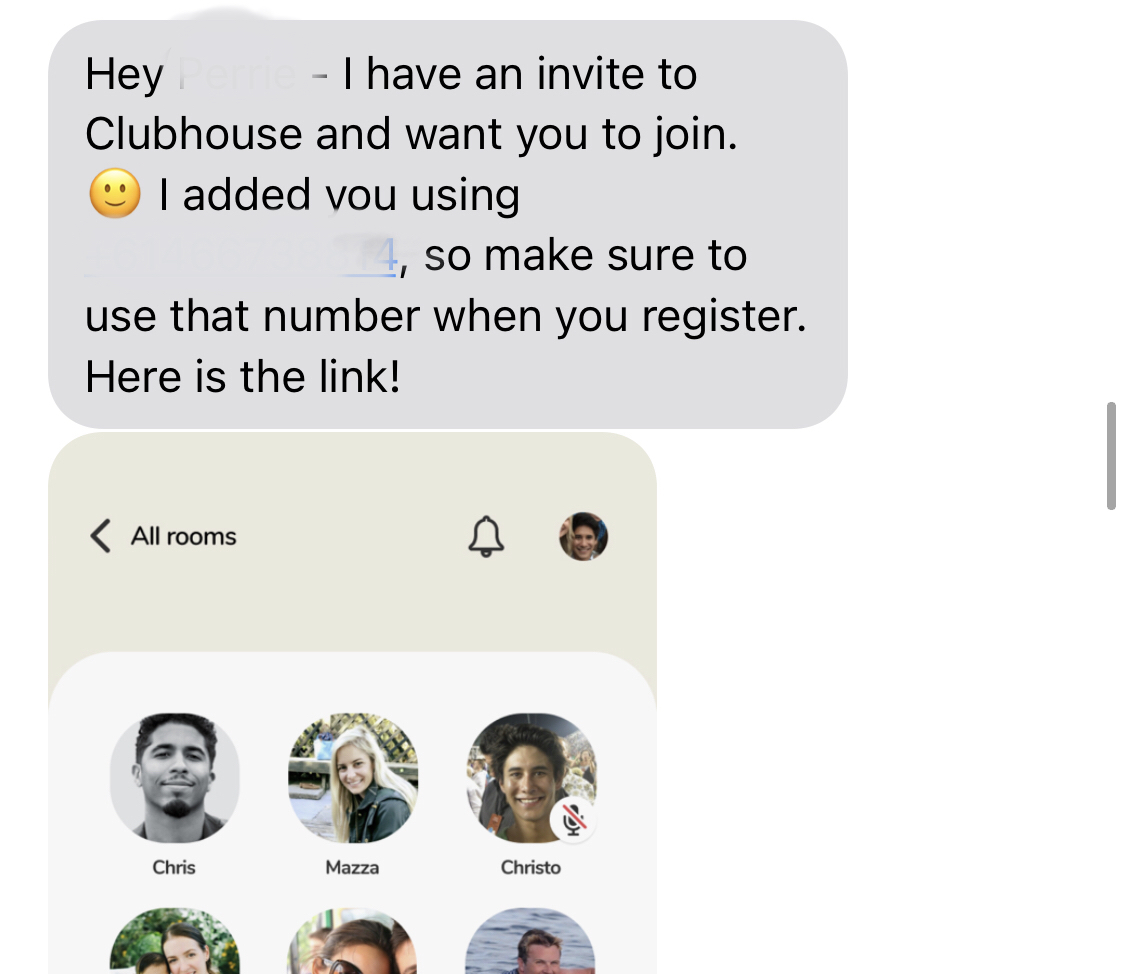
Make sure to sign up with the phone number that your invitation has been registered to, otherwise the app may not recognize your invitation.
Setting Up Your Clubhouse Profile
After you’ve received your invite and downloaded the app, you’ll have the option to link your Clubhouse account to Twitter to auto-generate your profile. If you don’t have – or don’t want to use – your Twitter account, you can set up your profile manually.
Make sure you choose a professional image for your profile and write a bio that aligns with your brand. As an audio-only app, first impressions count.
Pro-Tip: Tailor your bio and/or profile image to match a discussion or a club.
READ MORE: Building the Perfect Sales Funnel for Your Shopify Store
Show Who You Are, But Be Concise
Your Clubhouse bio is where you can tell everyone what you want to be known as and the first three lines of your clubhouse bio are searchable, so make it count!
You want to clearly let everyone know who you are and what you’re about, so avoid using custom fonts or indecipherable phrases.
A good rule of thumb is to lead with value: if you’re there for brand networking, include your brand and your position in the first line. If you’re looking to find other people in your industry, lead with that.
Take a look at these great bios below:
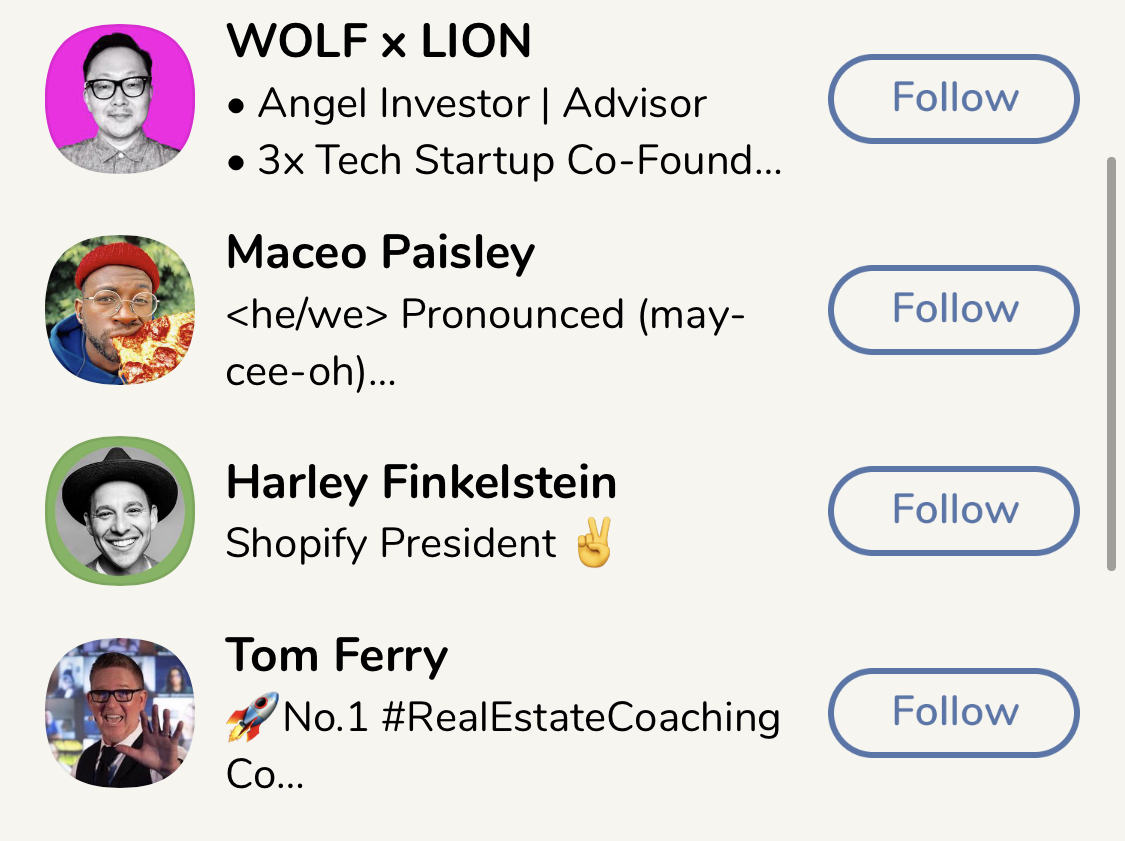
You can see who they are straight away, and you know why they’re here.
Maceo’s bio is interesting, as he has included a note on how to pronounce his name. This is a super useful tactic if your name is a little tricky to pronounce as it helps moderators and speakers address you directly.
READ MORE: How to Develop Powerful Business Core Values and Mission Statements
Have a Call to Action
Provide people with a way to connect with you outside of the app by giving them a clear Call to Action. You can put your email, your other social platforms, or any other CTA you think would be useful for others to see.
Have a look at Swan Sit’s profile below with a whopping 2.4 million followers. She’s added her social channels and has listed where she’s worked, her “office hours” which refers to the times she is logged online, interests, and even her business contact.

Your work history and followers might not be the same as hers, but it’s a good example of how to advertise yourself on the platform.
Customizing Your Feed With Interests
After entering all your information, you’ll be asked to select your interests. The interests you select are private to you, and they help the app generate a feed that would appeal to you.
The best part of Clubhouse for entrepreneurs is that they offer an entire section marked “Hustle”. Combine the tabs under “hustle” with other niches you’re interested in.
For example, if you’re looking to practice your pitch for a new meditation app launching in Atlanta, you can select these filters to see dedicated rooms and clubs in that niche.
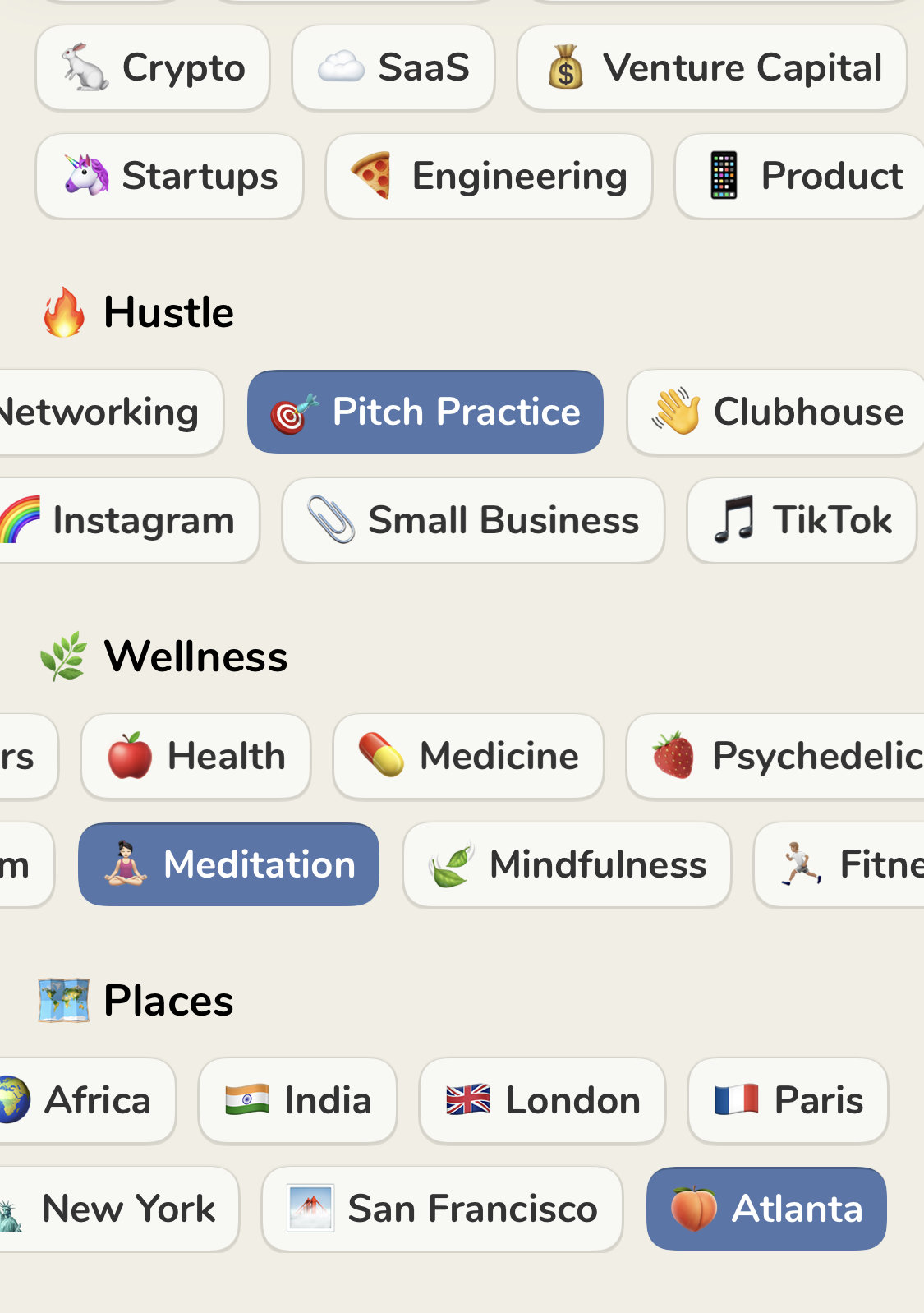
We recommend having a little play with your filters. Try to identify niches that interest you rather than going for broad strokes, which may leave your feed oversaturated. Don’t worry if you make a mistake with your interests, you can always go back to your settings to alter and adjust them at any point.
READ MORE: The Critical Lessons I Wish I Had Known Before Starting a SaaS Company
What is the Hallway?
Sometimes referred to as the homepage, the Hallway is the page you’re welcomed with when you open the app. Similar to a home feed, you’ll see information about your clubs and interests such as which rooms have active discussions, and any upcoming discussions on your calendar.
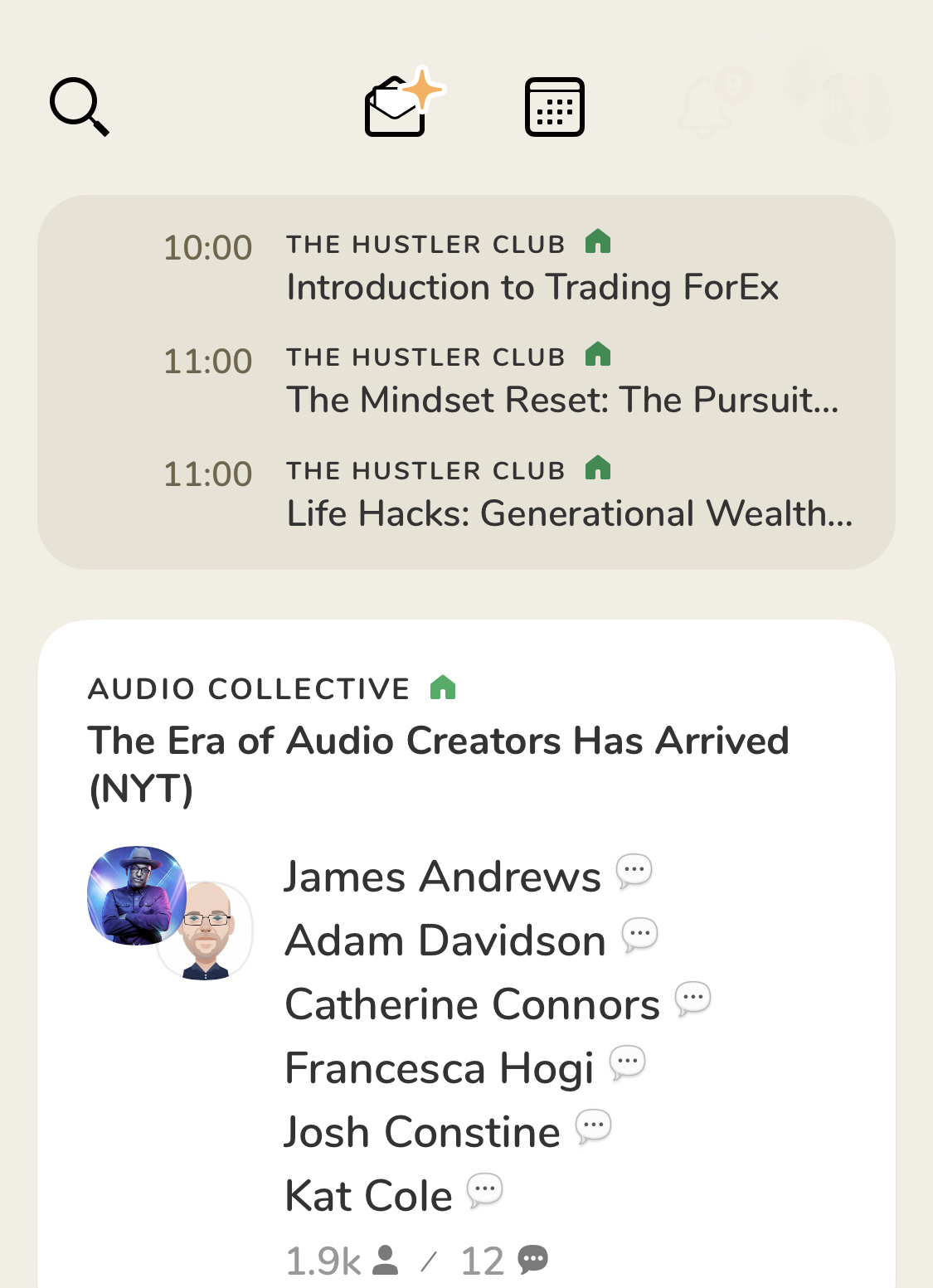
What Are Clubhouse Clubs?
Clubs are used to create small pockets or communities within the app. When someone begins a room, they have the option of making it exclusive to just the members of a club, or the wider Clubhouse community.
There are different levels of interaction with clubs depending on your status:
- Founder: creates the club. They decide rules, invitations, and can help outside members jump the invite queue without spending time on the waitlist
- Admin: Admins are chosen by the founder, or by the other admins. They have the power to approve new members, remove existing members, and open private or public rooms within the app
- Members: A member can create a private room for the club, but not a public room. They can nominate other Clubhouse users to join the club, and they have access to private and public rooms
- Non-members: can follow public club activities, but cannot join private rooms
At the moment, the app only allows for users to launch one single club at a time to oversaturation. The wait-time for launching a new club varies, but some reports say it’s around two weeks minimum.
Some brilliant clubs to add to your list include Shark Tank star and Foundr instructor Daymond John’s club “If You Want to Be Rich, Think Like This!!!”, HR professional Bria McNair’s “Small Business Saturday”, and “The StartUp Club” which is one of Clubhouse’s biggest clubs with almost 400,000 members.
READ MORE: The Branding Must-Haves That Don’t Occur to Startups Until It’s Too Late
How To Use The Explore Page and Finding Topics, Rooms, And People To Follow
The “Explore Page” is where you’ll find all the good stuff. You can manually search here for people, clubs, topics, everything. Underneath the search bar, you’ll see the “People To Follow” list, which is an app-generated list of notable users who might appeal to your interest filters, or just influential users who are trending across the app.
Under the “Find Conversations About…” tab, you’ll find a long list of the different conversations and topics that are being held across the app. Each conversation will have a list of the most active users in that niche, along with “clubs” to follow.
For example, if you are interested in listening to discussions about AI, you can see under the Tech tab a list of notable users, clubs dedicated to AI discussion, and other relevant content.
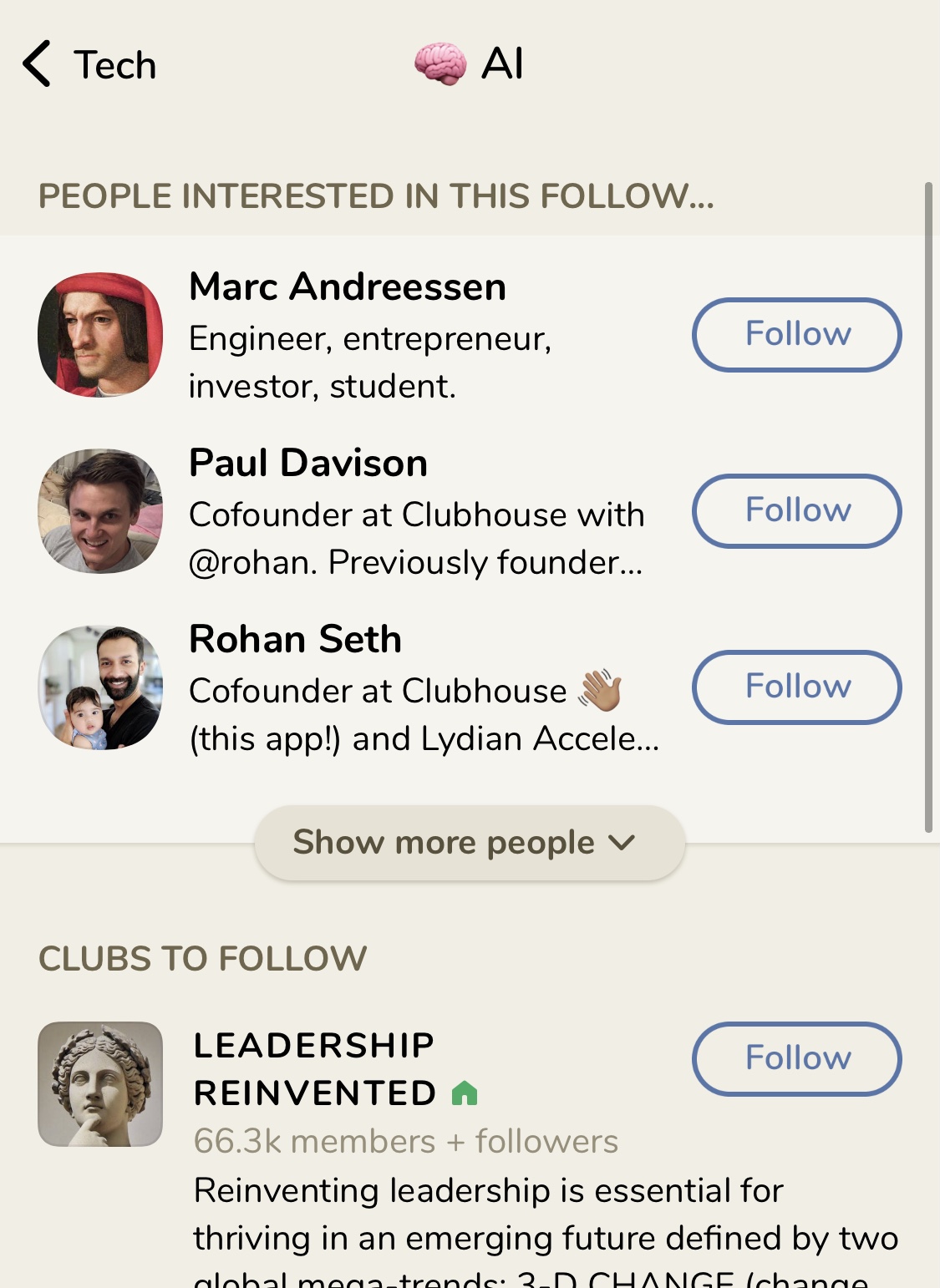
READ MORE: Is Your Business Not Making Enough Money? Here’s How to Fix It
What Happens When You Enter A Room
When you first enter a room, your mic will automatically be on mute (don’t panic!)
What you’ll see is a list of the room owners, the moderators, and the speakers. This area is called the “stage” and is where you’ll see all the active speakers’ profiles.
It’s a general rule to keep your mic on mute unless you’re speaking.
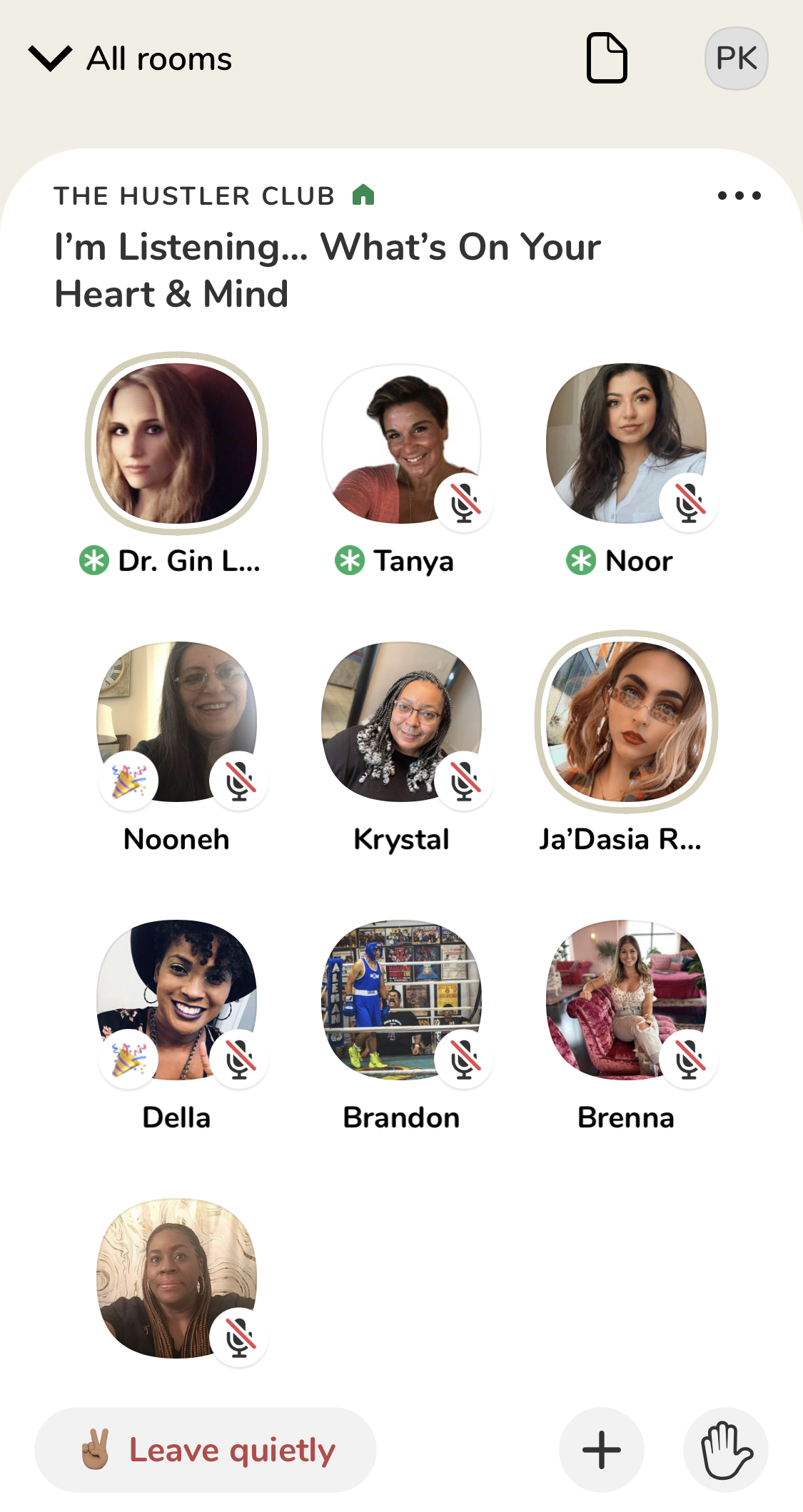
Right below the stage is an area labeled “Followed By The Speaker”, which is the front row of the audience. The people highlighted in this area are those who have already interacted with the speakers, or who have a relationship. Below the front row is the rest of the audience and all the other listeners.
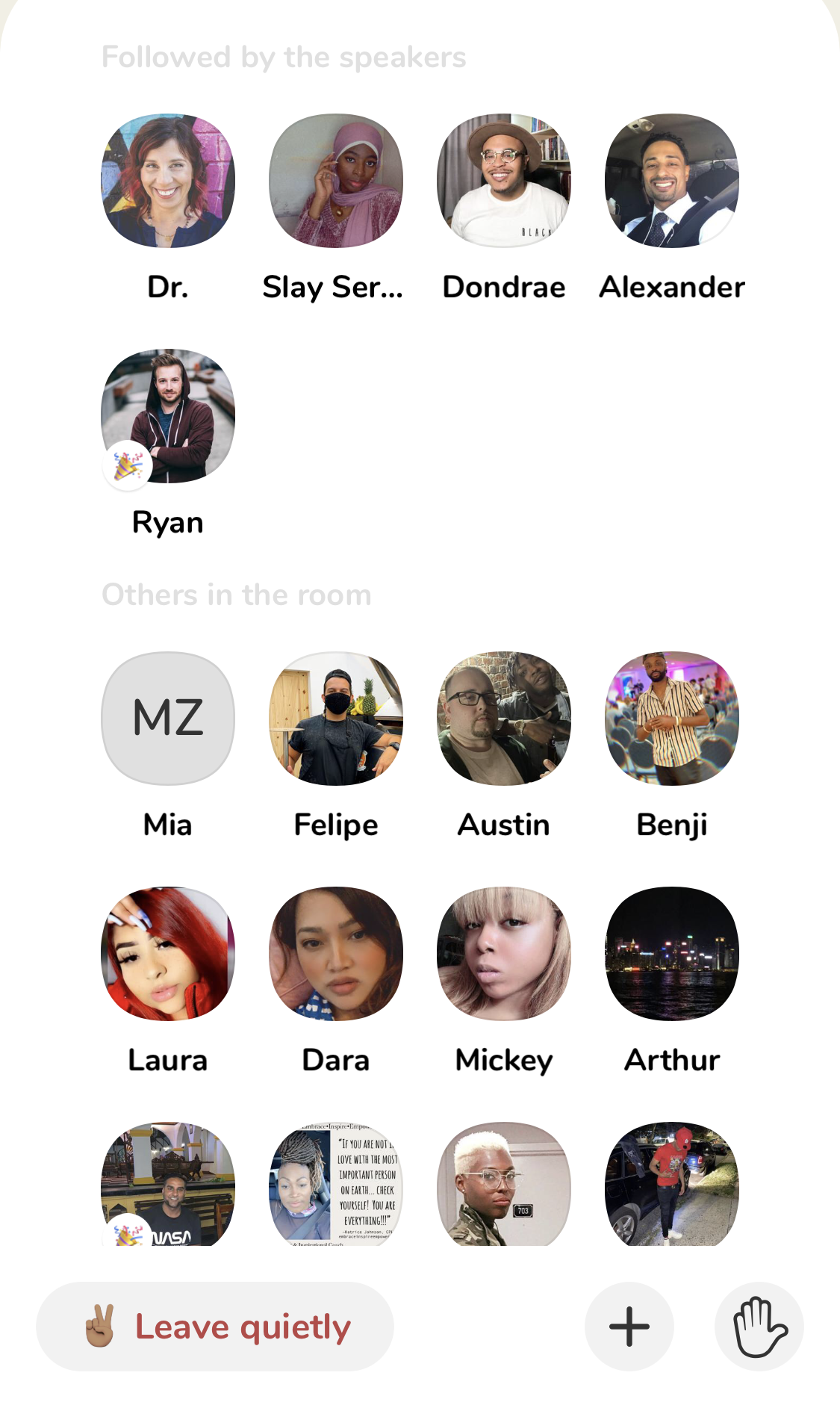
The “Leave quietly” button allows you to do just that: leave the conversation. The plus button to the right of the screen allows you to ping someone else into the room, a useful tool if you think a conversation is relevant to them, and the hand on the far right of the screen is how you let the moderators know that you want to speak.
Why Do People In Clubhouse Rooms Keep Saying PTR?
PTR, or “pull to refresh” gets mentioned a lot by speakers and may have you scratching your head or frantically Googling for a meaning.
Clubhouse has been designed as a drop-in audio chat, and sometimes speakers will temporarily change their profile pictures to show another picture or infographic that helps provide context to what they’re referring to. When you hear the moderators ask everyone to “PTR,” all you have to do is pull down on the screen to refresh the room. Not only will you see new profile images, but you’ll also see new people who have entered the room.
READ MORE: 7 Legit Methods to Teaching Yourself Any Skill
How To Start Your Own Conversations
Starting your own conversations and discussions is as simple as pressing the big green button that says “Start a room”.
After selecting “+Start A Room”, you’ll be given these options:
- Open – Start a room available to everyone
- Social – start a room with people you follow
- Closed – start a private group with select people
You’ll also be asked to choose a topic under 60 characters. Make sure you keep it relevant to the conversation you want to have. There’s no point in asking people to join an SEO-strategy planning conversation if you’re only going to discuss your favorite color.
Once you’ve started a room, you’ll be responsible for moderating the conversation, allowing people to speak, and adding or removing users.
READ MORE: How Competitive Collaboration Can Boost Your Business
How To Grow Your Business and Brand On Clubhouse
By now, you should be super excited to get started on Clubhouse. Not only is it just a lot of fun, but it’s also a fantastic way to blow up your brand, boost your following, and make a name for yourself on the platform.
Jumping in and out of rooms and listening to industry greats can be a bit a little intimidating, but if you want to gain a following and make a name for yourself as an authority figure on Clubhouse you need to start by being active.
It might be tempting to jump into a room of 2,000 other people and try to raise your hand to speak on stage, but unless you are already an established figure or influencer, you might not have much luck. Instead, it can be easier to start with smaller groups, and as you become more recognizable among the right circles, you’ll slowly work your way up the food chain.
Become An Active Community Member
In December 2020, Clubhouse announced they were testing a “Creator Pilot Program” with more than 40 Clubhouse influencers who they believed represented a “new class of online fame”. These influencers were rewarded for their active contributions to the Clubhouse community, and are given regular meetings with one of Clubhouse’s founders as well as early access to special tools designed for power users.
Josh Constine, an early-stage investor at the venture firm SignalFire who is part of the creator pilot program has said that:
“The top creators are people with magnetic personalities who attract audiences not just because of their titles and accomplishments, but because listeners want to spend time intimately hearing their thoughts with a chance to weigh-in themselves…these creators are generating big audiences on Clubhouse even if they don’t have large followings on other social platforms.”
What this means for anyone who is just starting on the app is that you don’t have to be an industry leader to be recognized within the Clubhouse community as an influencer. Instead, you need to be someone who is focused on contributing to conversations, starting and managing clubs, encouraging others to share their thoughts, and being charismatic and authentic.
One Clubhouse user Ashleigh Louise has quickly become a celebrity in her own right, labeled ‘the UK’s famous moderator’ for her engagement on the app. Louise has hosted rooms with famous and influential figures, and gained popularity thanks to her “firm and fair approach to controlling her rooms while creating some of the most entertaining topics“.
With more than 50,000 followers on Clubhouse, Louise is proof that positive community engagement on Clubhouse will catapult you ahead of the competition.
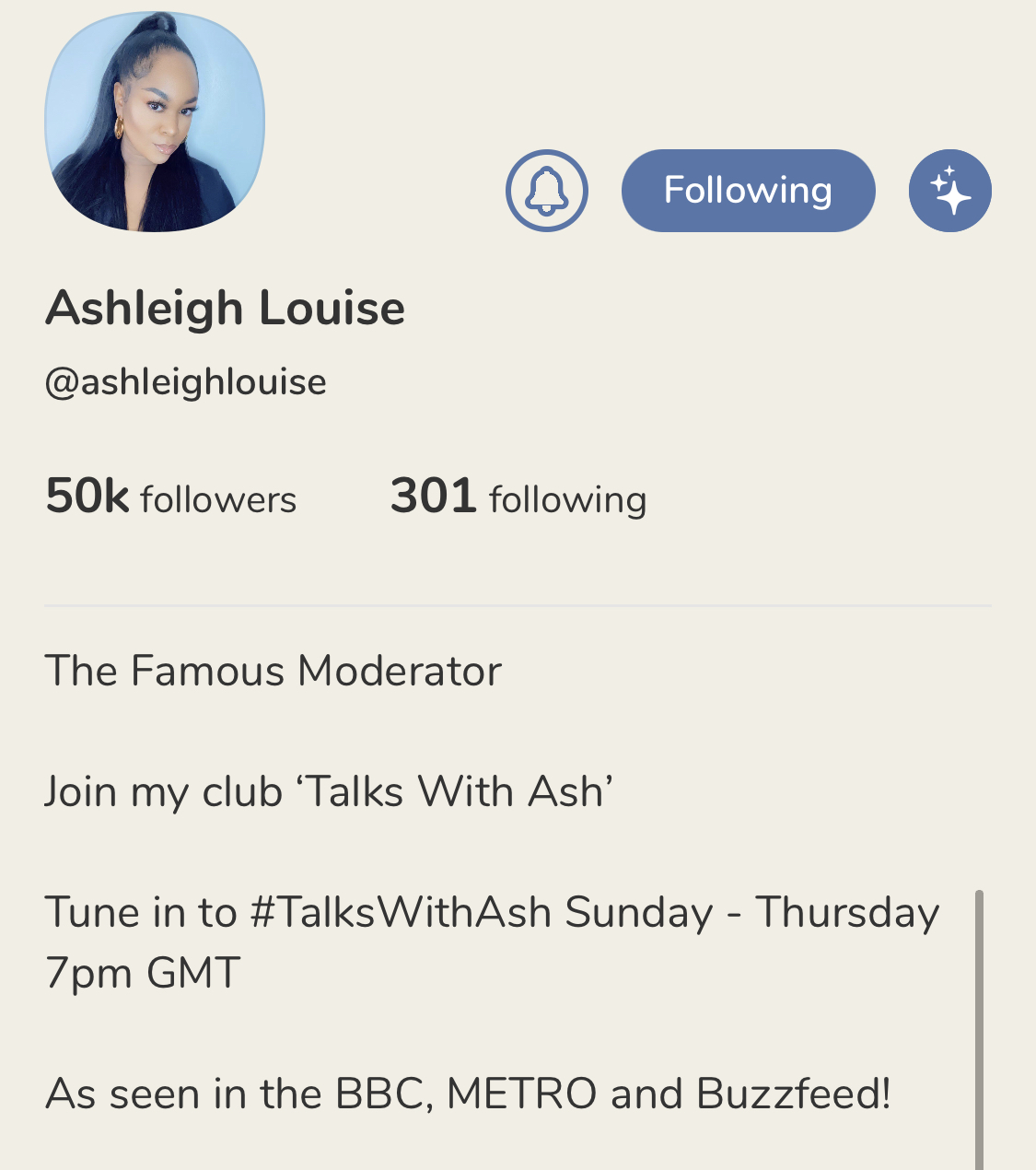
A good way to start by looking for discussions and clubs in your niche that have low numbers, under 10 people is a great place to start, as it will increase your chances of being invited on stage.
As you get more and more active contributing to conversations in a valuable way, hosts and moderators will begin to recognize you and encourage you to jump on stage where people will notice you.
The more you get your name out there, the more followers you’ll attract which can trickle down to your other social media platforms. If people like what you have to say, they’ll follow you. Next time you log in for a discussion or jump on stage, they’ll get a notification to jump on the app.
Ete Swimwear founder Jessica Williamson began coaching other female e-commerce entrepreneurs and decided to begin joining in discussions on Clubhouse. In just two days, she already had gained hundreds of new followers on Clubhouse, and also on her other social media platforms.

“It has proven a great opportunity to share my business insights,” she said. “Just being on stage got me sixty new followers. Even Tiffany Haddish followed me! (I doubled checked; it’s not a fake account).”
Thanks to Clubhouse’s ability to link seamlessly to Instagram, Williamson noted that her follower count suddenly skyrocketed after one discussion.
“I gained 200 new Instagram followers after just two days on Clubhouse. I also got about 50 new direct messages (DMs). In the past, I’d be lucky to get one or two DMs each month from people I don’t follow. DMs are usually a more meaningful way to connect with followers, as they ask serious questions and genuinely want your expertise.”
Take the time to contribute in a positive and valuable way, you’ll be noticed and possibly followed by key players, which ultimately helps establish good relationships in a more authentic way.
READ MORE: How to Create an Online Course Like Foundr
Opportunities to Connect With Investors and VCs
The app has already proven to be a success for many entrepreneurs looking to blow up their brand by providing them with a direct line to potential investors and VCs.
In January 2021, entrepreneur Kimi Weintraub landed a “groundbreaking” deal after she was given the chance to pitch her brand on Clubhouse’s Pitch Tank, a soft version of Shark Tank.
Each entrepreneur was given one minute to pitch their brand to a panel of industry giants such as Shark Tank’s Kevin Harrington, Undercover Billionaire’s Grant Cardone, and the founders of industry giants such as Netflix, Tinder, and Twitch.
“I was given one minute to pitch, and pitch I did! By the time I finished speaking, I had at least five ‘sharks’ fighting to partner with me in my e-commerce content creation company. Kevin Harrington even expressed interest in working with me in his company, As Seen on TV, to be a spokesmodel”.
Weintraub decided to choose “Amazon Queen” Akemi Sue Fisher who has over $2 billion in sales and is considered one of the most trusted e-commerce brand consultants in the world.
“Clubhouse has given me a huge opportunity to build connections with these business owners and drive sales to my company,” she said.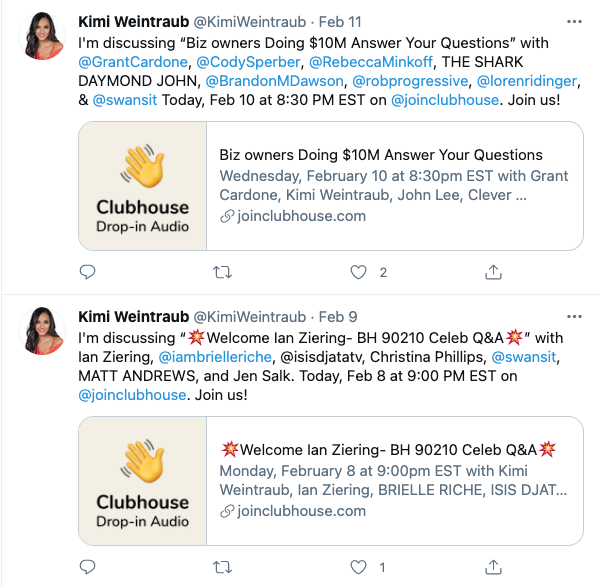
Presenting and pitching to industry greats might seem a little intimidating if you’re not usually comfortable speaking to a large group, but studies show that the power of voice and human psychology may actually work in your favor when pitching on Clubhouse.
People are more likely to feel a connection to you if they can hear your voice.
Damian Radcliffe of the University of Oregon notes that it’s the intimacy of audio that helps create a subconscious connection on Clubhouse.
“You can hear the inflections in people’s tone of voice, which convey emotion and personality in a way that text alone does not…moreover, hearing from people directly can generate empathy and understanding”.
Pitching on Clubhouse also helps to remove a lot of nerves. A journalist for Vulcan Post recently sat in on a virtual pitch session to judges including Bikesh Lakhmichand of 1337 Ventures, Paul Ark of Gobi Partners, Foo Tiang Lim of Seedplus.
“Because this took place over what was essentially a group phone call on an app and not in a hall full of eyes, the mood of the event felt quite casual. I imagine it would’ve also been less nerve-wracking for the presenters since they didn’t have to show their faces or their pitch decks,” she said.
So, what does this mean for entrepreneurs?
It means that Clubhouse is offering a safe space for pitch-practice, and also providing a space where pitching to numerous investors is possible without even leaving your home.
READ MORE: How to Stop Procrastinating and Smash Your Goals: A Psychology-Backed Plan for Entrepreneurs
Networking
Networking is a critical aspect of entrepreneurship. It cannot be overstated.
“Many successful entrepreneurs got to where they are now because of the help they got from others along the way. A strong professional network enables you to attain goals that you’d never achieve on your own”, reports Entepreneur.com.
That’s why we think Clubhouse is such a vital tool for entrepreneurs: it’s on-the-go networking.
In being an active member of Clubhouse, you’re giving yourself the chance to connect with like-minded entrepreneurs, and exposing your brand and skills to a variety of people.
Imagine if you got the opportunity to play your new hip-hop mixtape for Drake and 21 Savage, along with music producers Boi-1da, Cardo, and No I.D., and then get real-time feedback from these industry greats.
Back in Dec 2020, that’s what happened to the up-and-coming artist and producer Loudy Luna.

Looking to network with other music producers, she suddenly found herself playing her newest track to a room of her heroes. In an interview with Complex.com, she said she knew that one of her heroes Metro Boomin had been in the room last week, and was excited to see what he would say of her work.
“But then Drake and 21 Savage came in…Drake ended up following me on Instagram, too, which was exciting.”
” [After the room discussion] My notifications were going crazy on Twitter, Clubhouse, and Instagram,” Luna says of the attention she received after the battle. “Everybody was following me, DMing me and everything. It got overwhelming, but it’s exciting. I’m still going through my DMs from that day. I’ve been tapped in with a couple of producers and artists.”
Whether you’re an artist, a pastry chef, a marketing specialist, or even just passionate about the space you’re in, Clubhouse gives you the opportunity to network with not only the greats of your industry but also other passionate people in your space.
READ MORE: Checklist for Starting a Consulting Business
You Can Learn From Others
During Elon Musk’s interview on Clubhouse, he dropped this gem:
And that was just one small insight he dropped during his long interview.
As an entrepreneur, the greatest gift you can give yourself is the gift of learning. Even here at Foundr, we value learning so much that it is part of our core values and mission: Learn & Be Curious.
On Clubhouse, you can be a fly-on-the-wall for some incredibly valuable discussions. You not only have access to other people in your industry, but you also have access to some of the greatest minds of our time.
Keep your eye out for discussions concerning your industry and your interests. If you’re looking to launch an e-commerce store that sells fitness wear, become a listener in fitness equipment discussions to hear feedback from your potential customers.
Because Clubhouse is all about passive listening, you can make notes on what people say are pain-points with their equipment, desires, hates, and competing brands, making it great for general research and insights, too. Additionally, you can chime in with a question yourself if you want to delve into anything further.
Clubhouse also helps you to keep a finger on the pulse of your industry. Clubhouse gives you the chance to listen and learn from the best of the best in your space.
By following influential people, competitors, and other innovators in your niche, you can hear about new products, ideas, innovations, news, and even gather advice without saying a peep.
READ MORE: How to Come Up with a Great Business Name for Your Company
The Future Of Clubhouse
In typical tech style, Clubhouse is moving and evolving at such a fast pace that by the time you’ve read this article, it might be a completely new app. For now, the success of Clubhouse all comes down to whether or not the app is able to scale properly and compete with the big social media empires of today.
Competing With The Big Brands
As Clubhouse continues to grow in users and notoriety, social media empires Twitter, Facebook, and Instagram have all announced similar additions to their platform in an effort to ride the wave.
In February 2021, the NY Times reported that Facebook has begun a similar “audio chat product”, which some experts note has echoes of Facebook’s past behavior of mimicking and overtaking other companies innovations (notably, TikTok and the rollout of Reels).
Twitter has also confirmed their similar concept named “Spaces”, and in March 2021, Forbes revealed that Instagram was going to be “Adds New Group Livestream Feature Amid Growing Pressure From Clubhouse” .
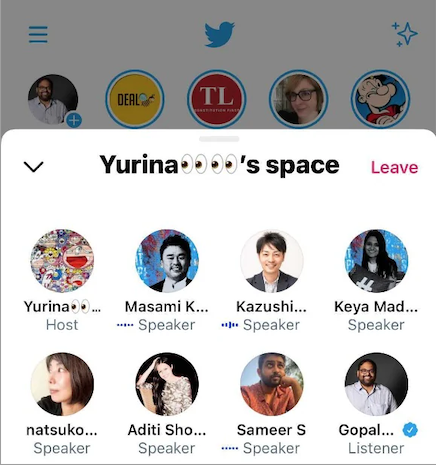
As Clubhouse gains momentum and the giants go to war, only time will tell if Clubhouse will continue to hold its own, or if it will face the same fate as other social media apps like Vine, YikYak, and Myspace.
Monetizing, Influencers, and Subscriptions
As of now, Clubhouse has no built-in method for monetization. The app is free, creating an account is free, there are no ads or paywalls, and creators and notable figures aren’t being paid.
For a company that was recently valued at $1.4 billion, making money for its creators will be its biggest challenge.
As Forbes’ David Bloom put it, “you can tell when a hot new social media platform hits a certain level: it starts to worry how its creators will make money.”
For now, there are only whispers of what Clubhouse plans to do. Along with the Creator Pilot Program, Clubhouse has said that their main goal is to help pay their creators and contributors:
“What we want to allow them to do is to make a living directly on Clubhouse through things like subscriptions and ticketed events and receiving tips from listeners who are happy to pay them directly for the experiences that they’re creating for them.”
“Creators are the lifeblood of Clubhouse, and we want to make sure that all of the amazing people who host conversations for others are getting recognized for their contributions,” they wrote. “Over the next few months, we plan to launch our first tests to allow creators to get paid directly—through features like tipping, tickets or subscriptions. We will also be using a portion of the new funding round to roll out a Creator Grant Program to support emerging Clubhouse creators.”
READ MORE: The 3 Best Low-Cost Businesses to Start with $1,000 or Less (Even $0!)
Censorship and Difficulty Moderating Discussions
Unfortunately, the app was swiftly banned in China.
The app has also been struggling with monitoring discussions and rooms. Many female journalists have spoken about being targets of bullying and harassment on the platform, and there are multiple reports of rooms descending into antisemitism, racism, and COVID-19 denialism.
Being an audio-only platform, bots have trouble picking up harassment or hate-speech within groups.
Vanity Fair says that “it’s the type of dialogue that wouldn’t necessarily be flagged on Twitter or Facebook either…Unlike other tech platforms, which have begun to warn users about information that’s false or misleading, Clubhouse does not provide visible disclaimers to counter misinformation.”
Clubhouse has already hired moderators and other protocols in place to ensure a safe space on their platform. CEO Davidson has said “Any social network needs to make moderation a top priority.” However, he also stressed that the goal for the platform was to provide a place of “free speech and dialogue”.
For now, it will be up to the community members to keep Clubhouse a safe-space, free of harmful language and topics. Fingers crossed we can all behave ourselves, and enjoy the platform for what it is: a great way to connect with others.
Have you been on Clubhouse yet? What do you think of it and do you think it will be a valuable platform in the future? Let us know in the comments!
The post Ultimate Guide to Clubhouse for Entrepreneurs appeared first on Foundr.
via https://AiUpNow.com March 7, 2021 at 11:07PM by Perrie Kapernaros, Khareem Sudlow,
